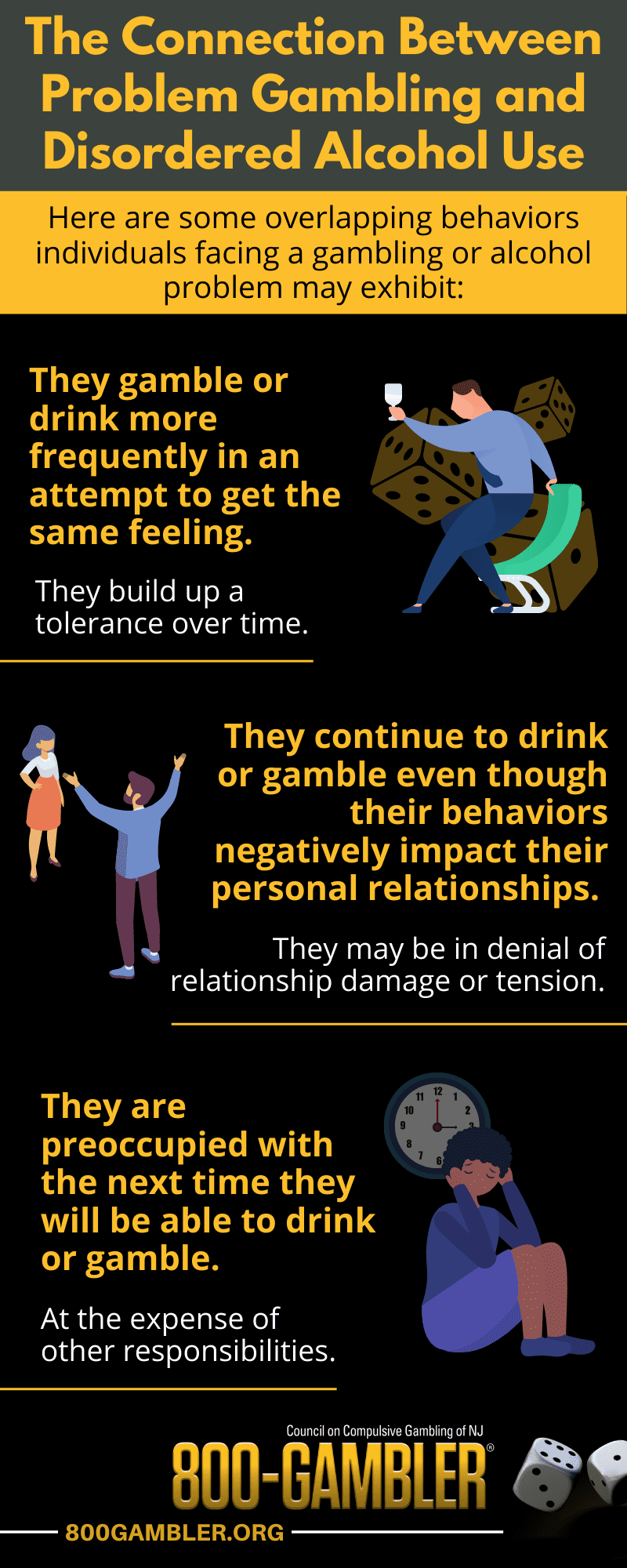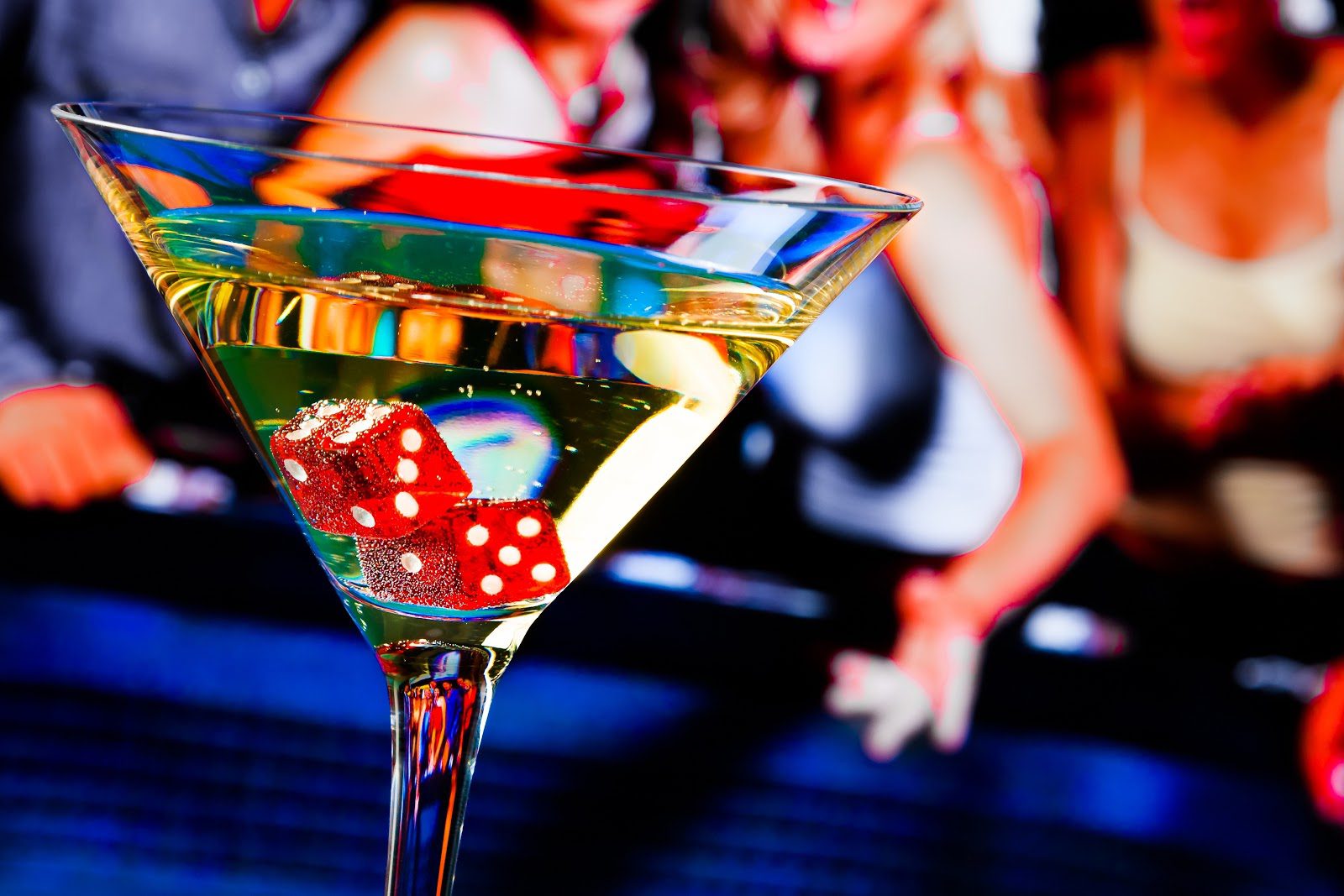A gambling problem (sometimes referred to as an “addiction) is undoubtedly dangerous in its own right. However, when you couple it with disordered alcohol use (“dependency”), it can be catastrophic. Unfortunately, the combination is far too common.
In honor of Alcohol Awareness Month, the Council on Compulsive Gambling of New Jersey (CCGNJ) is taking some time to focus on the connection between problem gambling and alcohol use. The two frequently occur alongside each other, to the point that those who struggle with both can find it hard to disentangle the effects of one from those of the other. We hope that opening up the conversation will continue to demystify the disorders, lift the stigma surrounding them, and encourage those facing problems and their loved ones to seek help.
Alarming Statistics Regarding the Link Between Gambling and Alcohol Use
- The odds of developing a gambling addiction increases 23-fold for people who are already dealing with a dependency on alcohol.
- Three to five gamblers out of every hundred struggles with alcohol addiction.
- About 10 to 20 percent of people with a substance abuse problem also have some kind of gambling disorder.
- The rates of alcohol abuse for a person with a gambling problem compared to those without one are four times higher.
The Connection Between Gambling and Alcohol
Gambling and alcohol have a closely intertwined relationship. Both are legal, and when done responsibly, both gambling and alcohol use are widely accepted forms of entertainment and socialization. However, both also have the potential for problem behaviors. Given that drinking and gambling commonly occur in the same establishments (not to mention, many casinos provide free drinks), they often occur alongside each other.
Additionally, alcohol can compound the effects of a gambling disorder. For example, gamblers may use alcohol in excess to celebrate a win or cope with anger and depression after a loss. The lack of inhibition caused by alcohol intoxication can also lead to reckless gambling behavior that only spirals further as time goes on.
Similarities Between Problem Gambling and Disordered Alcohol Use
Alcohol and gambling disorders are similar in various ways. A basic definition for both is that either takes priority over activities of daily life — which can have a ripple effect on familial relationships, career, physical health, mental wellbeing, financial stability, and so on. Let’s take a look at some of the warning signs that an individual who may be facing a gambling or alcohol problem may be experiencing:

Furthermore, a strong link between alcoholism and problem gambling has been researched. In a national study, 73.2% of individuals diagnosed with a gambling problem also had an alcohol disorder.
While there is no chemical substance directly affecting the brain when you gamble, it can still trigger similar effects to alcohol. Individuals with gambling problems may feel a “high” when they gamble or anticipation leading up to their next opportunity to do so. Just like those dependent on alcohol can exhibit negative symptoms after not drinking for a period of time, problem gambling withdrawal can occur, as well — some symptoms of which can include headaches, insomnia, and even anxiety.
Differences Between Problem Gambling and Disordered Alcohol Use
Something that distinguishes a gambling problem from disordered alcohol use is that those facing alcoholism often display more overt, or obvious, signs of their struggle. Someone who is frequently intoxicated may appear disheveled and have a difficult time even walking properly. They may slur their speech or talk slowly, and possibly smell like alcohol. These are among the more physical, readily-apparent symptoms of an alcohol disorder. Signs of problem gambling can be significantly less detectable.
Someone who is gambling away their savings or going without proper medication and adequate nutrition for money to bankroll their gambling may fly under the radar of a friend, co-worker, or even family member. Additionally, feeling irritable, angry, anxious, or depressed aren’t feelings that are exclusive to gambling problems — further masking their problem behaviors as far as gambling goes.
800-GAMBLER Has Resources for Alcohol and Gambling Problems
The Council on Compulsive Gambling of New Jersey (CCGNJ) offers support, treatment, and hope for New Jersey residents struggling with a gambling disorder, and can offer specialized treatment resources for gamblers who also have a substance use disorder. If you or a loved one is currently dealing with an addiction to racetrack wagering in Monmouth, NJ, sports betting in AC, casino gambling, or any other type of problem gambling behavior, call the Council on Compulsive Gambling of New Jersey at any time by dialing 1-800-GAMBLER.
Sources



